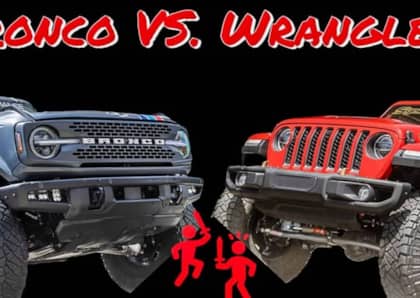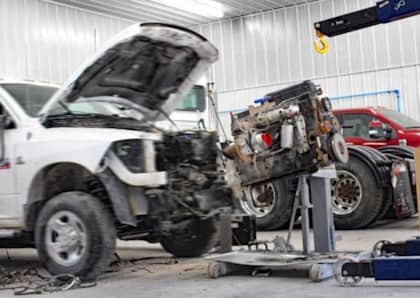Review: How Does The 2021 Ford Bronco Wildtrak 4x4 SUV Handle Daily Driving?
Few recent SUVs have stirred up as much interest as the new Ford Bronco. By resurrecting the rectangular lines of the original '60s-era truck and wrapping that retro sheet metal around a mechanical package intended to tackle nearly any off-road obstacle, Ford has generated massive hype around the Bronco, positioning it as the first credible challenger to the Jeep Wrangler's hardcore trail dominance in over a decade.

Of course, one does not live by mud pits and rock climbs alone. A key component of every modern off-road rig is its ability to parse the demands of daily life without making you long for the comforts of a softer SUV. The 2021 Ford Bronco specifically promises to better the experience of its Jeep rival in this respect. Does it deliver? I spent a week behind the wheel of the top-tier Wildtrak trim to find out, subjecting the Bronco to the ins and outs of city life as well as an extended tour through the countryside to get a feel for what it has to offer commuters and road trip fans alike.
Hardcore Credibility Established
For those focused specifically on off-roading, there are two flavors of Bronco that call out the loudest: the Badlands and the Wildtrak, each of which can be had as a two-door or a four-door. The former features 33-inch mud terrain tires, an automatic swaybar disconnect, rock rails and skid plates, locking front and rear differentials, a 'High-speed Off-Road Suspension System (or HOSS) that features Bilstein shocks, and a full suite of drive modes under the 'Go Over Any Type of Terrain' heading. This is on top of a trail turn assist feature that locks the inner brakes to pivot the truck around a tight corner, as well as a 'one-pedal' off-road speed control system.

The Wildtrak includes almost all of the above, but swaps in Ford's 2.7-liter turbocharged EcoBoost V6 in place of the Badlands four-cylinder turbo, which nets 330 hp and 415 lb-ft of torque when using premium fuel (in place of the smaller motor's 300 hp and 325 lb-ft premium rating).

A 10-speed automatic transmission becomes standard (ruling out the 7-speed manual featured in the Badlands), and so does the Sasquatch package, which includes 35-inch mud terrain tires. Given that the Wildtrak is intended for 'high speed' shenanigans, the rock rails are missing, and leather seats and carpet replace the rubber-and-vinyl-filled Badlands cabin.
Still A Tough Customer
How does all of that gear translate when rolling down pavement rather than pounding sand and sage? Ford has made a valiant attempt to tame the rougher edges of the Bronco package by outfitting all models with an independent front suspension rather than the solid front axle found in the Wrangler.

While this substitution might give the Jeep a traction and durability advantage in certain off-road situations, on the street the Bronco's IFS eliminates the wandering steering that can make the Wrangler an exhausting highway companion, Jeep's vague front end feel combines with its large knobby tires to follow every crease and crack in the asphalt, especially on well-traveled, rutted roads. The second advantage to the independent setup is its ability to subdue rough conditions without any horizontal shudder, avoiding the lateral sidestep at speed that is a common feature of any SUV with a double stick-axle arrangement.

In terms of handling, however, it would be a mistake to consider the Ford Bronco to be at the same level as other modern sport-utility vehicles. Cornering remains ponderous due to the weight and bulk of the model, and the 35-inch tires on my Wildtrak tester certainly didn’t do anything to improve its road-holding ability. The rear axle also continues to crash-bang its way over bumps, bouncing passengers and causing the fiberglass top in the four-door model I drove to creak and squeak in harmony.

The generous torque delivery of its turbocharged V6 makes the truck much quicker than expected, but I rarely felt compelled to flog the throttle as the overall suspension package is far more conducive to a slow and steady pace. This is particularly true if one wants to at least preserve the illusion of decent fuel mileage (I saw 16 mpg in combined driving, just below its 18-mpg EPA rating).
Coarse Where It Counts
The sound of the Bronco Wildtrak's roof twisting on its body-on-frame platform wasn't the only audio intrusion during a typical drive. At higher speeds the wind and tire noise generated by the Ford's flower-planter shape and over-sized rubber fills the cabin to the point where it become difficult to hear the details of the truck's Bang & Olufsen stereo system. Driveline rumbles and booms are also loud and irritating.

It's a situation that will be familiar to anyone who's spent time in the similarly-boisterous Wrangler, but unique to the Bronco is the jiggle window glass of its frameless doors, which had me concerned about potentially snapping them off while closing them in the cold, as well as continued production problems with the fiberglass roof itself, with varying degrees of quality and availability plaguing hardtop models.

As for the rest of the Bronco's cabin, riders both front and rear benefit from generous space to stretch out, and even with its gun-slit windshield visibility is reasonably good thanks to the SUV's tall ride height. The vehicle's SYNC 4 infotainment system is easy to use, if a bit plain-looking, which matches the surprisingly basic graphics delivered by the Bronco's digital gauge cluster. Much of the switchgear is pulled from Ford's parts bin, fully functional but at times giving off the impression that you're sitting in a mash-up between the Expedition, Edge, and F-150.
Seek Refinement Elsewhere
Driving the 2021 Ford Bronco Wildtrak on an extensive tour of civilization suggests an SUV that has a foot in two different worlds. Rugged and handsome, the Wildtrak is certainly more pliable on the highway and in the tightest of corners than the Wrangler it's clearly aimed at, but that's a relatively low bar to clear. Overall, the SUV doesn't deliver much in the way of refinement, and feels like more of a throwback than one would expect from a modern clean-sheet design.

The more important question is how happy will you be tooling around town in the Bronco after you're back from the weekend trailhead? If you're expect a fully modern sport-utility experience, you're likely to be disappointed by what Ford's latest truck has to offer: this is very much a purpose-built all-terrain exploration platform that asks owners to make a number of compromises related to its tough chassis, bulky size, and removable roof and doors.

For the majority of those intrigued by the Bronco's impossible-to-ignore road presence and legitimate GOAT capability, those trade-offs won't impact the buying the decision. Few who are attracted to a big Lego brick of a truck like this one are unaware that it won't be able to match the more genteel crossover confidence that is common on today's roads. For everyone else, Ford's latest should come with a gut-check about just how different a daily drive it actually delivers compared to Jeep's anachronistic offering.











